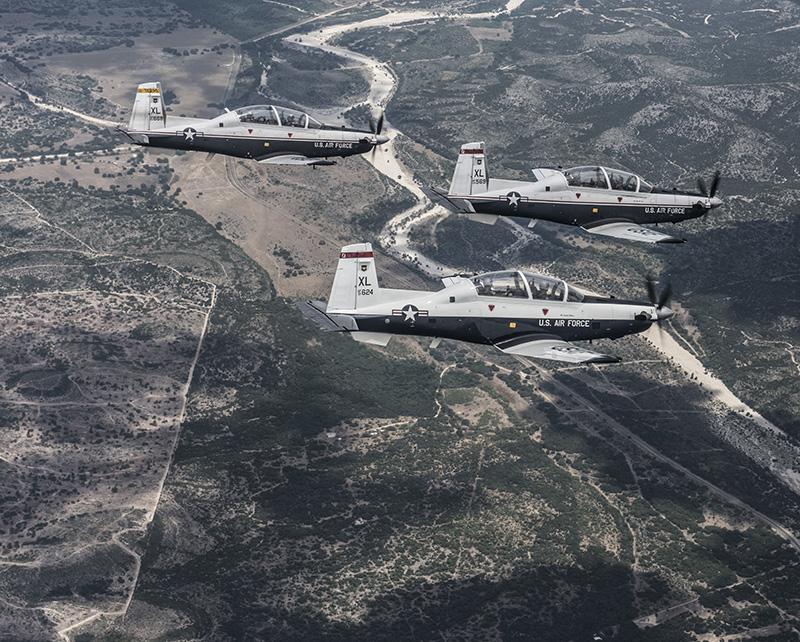
Three T-6A Texan II trainers in flight over Texas, 2020.
A U.S. Air Force instructor pilot has died after the ejection seat of a T-6 trainer aircraft activated during ground operations at Sheppard Air Force Base, near Wichita Falls, TX.
The pilot was identified in an Air Force release as Captain John Robertson, of the 80th Operations Support Squadron. Capt. Robertson sustained injuries in the May 13 incident, "when the ejection seat of the T-6A Texan II aircraft he was in activated during ground operations," and died the following day.
"This is a devastating loss for Captain Robertson's family and loved ones, and for the entire 80th Flying Training Wing," Col. Mitchell J. Cok, acting wing commander, said in the statement. "Captain Robertson was a highly valued Airman and instructor pilot. Our deepest condolences go with all who knew and loved him." Col. Cok commended the "heroic efforts" of maintenance, security, fire and medical teams at the base, and staff at United Regional Hospital. "Their efforts allowed time for Captain Robertson's family to be at his side when he passed," he said.
The T-6 uses the US16LA JPATS (Joint Primary Aircraft Training System) ejection seat, manufactured by Martin-Baker. It is a lightweight variant of the company's Mk16 seat which, in different versions, is flown in platforms including F-35, Rafale, Typhoon and T-38.
The Sheppard AFB release says that an "interim safety board investigation was convened immediately after the incident," and that a full Air Force Safety Investigation Board would be in place by the end of the week. The board will release its findings when the investigation is complete. There has been no indication of how long the investigation is expected to take.
The 80th FTW is host to the Euro-NATO Joint Jet Pilot Training Program, which "trains 50 percent of all U.S. Air Force fighter pilots and is the sole source of fighter pilot training for partner nations Belgium, Denmark, Germany, the Netherlands and Norway," according to the Wing's website.
In 2022, USAF temporarily grounded hundreds of its T-38 and T-6 training aircraft while checks were carried out on explosive cartridge actuated devices (CAD) in the seats. At that time, the concern was that manufacturing defects in the CADs might lead to the seats failing to fire when commanded. In literature promoting its Mk18 seat, developed for F-16 Block 70 and 72 aircraft, Martin-Baker notes that it manufactures its own CADs.
The incident comes in the same week that a report from the House Armed Services Committee questioned whether assumptions underpinning the sole-source selection of Collins Aerospace to supply the ACES 5 ejection seat for the Next Generation Escape System "remain valid". As AWST reported May 14, this could lead to a recompete of the 2020 contract, which covers seats for the T-7A trainer; F-15, F-16 and F-22 fighters; and the B-2 bomber. A new competition would likely see a bid from Martin-Baker since the Mk18 seat is already qualified and is being integrated on Block 70 F-16s.



Comments
"suicide"? That has to be ruled out completely. With someone as skilled as the flier in question I'd highly doubt there was an unintentional deployment........... Unless there was a maintenance issue. It would make it easier for the pilot's family to deal with but if it was an intentional activation would make it harder to comprehend.